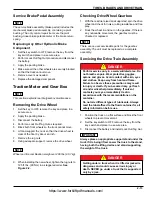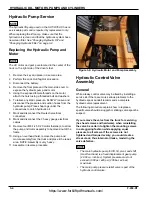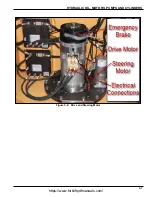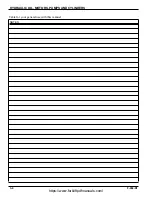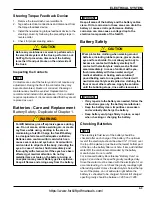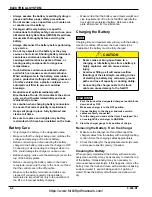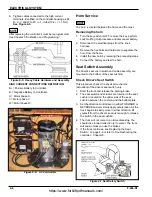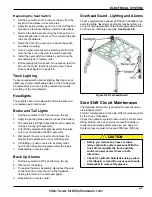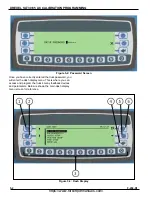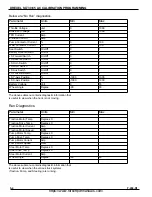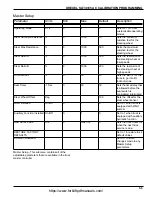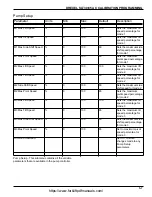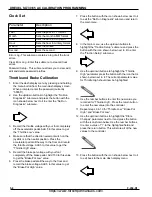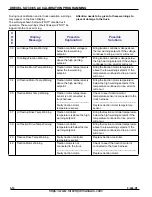
ELECTRICAL SYSTEM
4-3
Steering Torque Feedback Device
1.
Remove the lower dash cover weldment.
2. Tag each electrical connections and disconnect from
the torque feedback device.
3.
Install the new steering torque feedback device to the
steering column by following the preceding steps in
reverse order.
4.
Check for proper steering action.
CAUTION
Inspecting the Contacts
NOTE
Contactors are set at the factory and do not require any
adjustment. During the life of the contactor, they may
become discolored, blacken or corroded. Cleaning or
maintenance should be avoided. Replacement is
recommended instead of maintenance. If one contactor
requires replacement, it is recommended that they are all
replaced as a set.
Batteries - Care and Replacement
Battery Safety - Duplicate of Chapter 1.
WARNING
IMPORTANT
Keep all areas of the battery and the battery cables
clean. Dirt or corrosion in these areas can drain the
battery or cause erratic performance. Battery
corrosion can also cause a voltage drop to the
electrical components of the forklift.
Battery Safety
CAUTION
IMPORTANT
• If any repairs to the battery are needed, follow the
instructions given by the battery manufacturer.
• Keep the battery clean. Impurities can weaken
and eventually discharge the battery.
• Keep battery vent plugs firmly in place, except
when checking or charging the battery.
Checking Batteries
NOTE
The electrolyte fluid level of the battery should be
checked after each charge of the battery. The optimum
level of the electrolyte should be about 1/2” (13 mm) over
the top of the plates, or just below the lowest bottom part
of the lip on the battery filler vent hole. If low, add distilled
water OR the solution recommended by the battery
manufacturer. Do not overfill.
For increased battery life reference “Battery Care” on
page 1-4 and check the specific gravity readings daily.
Since the water must be mixed with the electrolyte for an
accurate reading, do not check the gravity readings right
after adding water. Unless the electrolyte is below the top
level of the plates, do not add water right before the
battery is scheduled to be charged. Normal full charged
specific gravity should be between 1.265 and 1.285.
Before any maintenance or work is performed on
the electrical system of the truck, perform a Lock
Out/Tag Out procedure, disconnect the battery,
raise the lift and put blocks on the underside of
the truck.
Forklift batteries give off explosive gasses during
use. Do not smoke, strike a welding arc, or create
any flame while using, working in the area or
maintaining a forklift. Charge the forklift battery
in a designated area with adequate ventilation.
Batteries also contain sulfuric acid which can
cause severe skin and eye burns. Avoid sulfuric
acid contact to all parts of the body, including the
eyes. In case of contact, flush immediately and
thoroughly with clean water. If the eyes have been
effected, get medical attention. Do not lay
metallic items or tools on the battery. Arcing or
an explosion may result. Battery gas is explosive.
Keep all flames and arcing away from the battery.
Wear protective clothing when working around
batteries, including rubber aprons, gloves, boots,
eye and face shields. Do not allow your body to
become in contact with battery electrolyte. If
contact with electrolyte is made, wash effected
area immediately. In case of contact with eyes,
flush immediately with clean water and get
medical attention. A baking soda solution (1
pound baking soda to one gallon of water) will
neutralize electrolyte acid spilled on clothing, the
floor or most other surfaces. Apply the solution
until the bubbling stops, rinse with clean water.
https://www.forkliftpdfmanuals.com/

